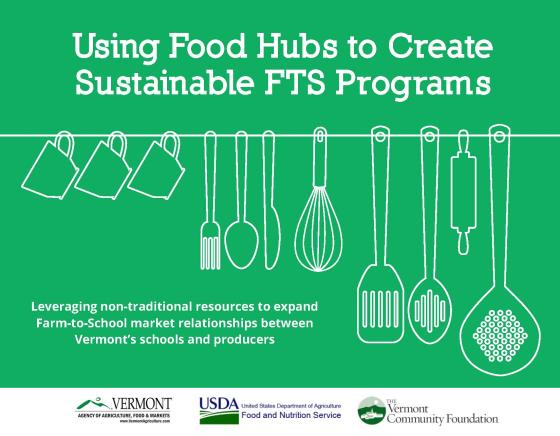Posted March 5, 2015 at 08:39am by Faith Raymond
New Resource Available to help Food Hubs Support Sustainable Farm to School Programs

Contact:
Abbey Willard
Vermont Agency of Agriculture, Food, & Markets
802-272-2885
New Resource Available to help Food Hubs Support Sustainable Farm to School Programs
The Vermont Agency of Agriculture, Food and Markets (VAAFM) is pleased to announce the publication of a new resource, Using Food Hubs to Create Sustainable Farm to School Programs, which explores the key roles that Food Hubs can play in the development, support, and maintenance of successful Farm to School (FTS) programs. While Food Hubs remain a relatively new and evolving concept within the national food movement, Vermont is home to over a dozen Food Hubs, whose missions range from the aggregation, processing, and distribution of locally made foods, to consumer education, to farmer/producer technical assistance.
Created in collaboration by the VAAFM and four Vermont Food Hub organizations, Addison County Relocalization Network, Green Mountain Farm to School, Mad River Food Hub/Mad River Localvores, and Rutland Area Farm and Food Link, this new resource highlights four case study examples demonstrating different ways Food Hubs can utilize their existing infrastructure and expertise to support and strengthen Farm to School programs in their communities.
The development of this new Food Hub Guide was made possible by a $100,000 grant awarded by the USDA’s Farm to School Grant Program to VAAFM in 2012 to explore potential synergies between Food Hubs and Farm to School programs in Vermont. The terms of the USDA grant also leveraged an additional $80,000 in matching funds from regional and community partners, including Vermont Community Foundation’s Food and Farm Initiative.
The grant funds were employed to develop a “Community of Practice” within which VAAFM, joined by NOFA-VT and its four Vermont Food Hub partners, worked collaboratively to achieve the following objectives:
-
Research and identify the specific needs of Farm to School programs throughout Vermont
-
Propose and test possible models of partnership and support between Food Hubs and their local Farm to School programs
-
Share best practices and lessons learned
-
Develop case studies based on shared learning to be published in the final Food Hub Guide document: Using Food Hubs to Create Sustainable Farm to School Programs
After a year of pilot partnerships between Food Hubs and Farm to School programs, evaluation of the Community of Practice by UVM Center for Rural Studies reported that local food purchases among schools engaged with their regional Food Hub increased by 58% (overall) and 62% (per capita).
While the partnerships between Food Hubs and Farm to School programs were positive across the board, the specific roles played by Food Hubs varied greatly, including:
-
Fostering connections between schools and local farmers/producers
-
Purchasing, aggregating, processing, and distributing local food directly to schools
-
Consumer education
-
Farmer/producer technical assistance
-
General program support
Vermont continues to be a national leader in Farm to School programming, impacting over 27,000 students since initiation of our grant program in 2007. The demand for fresh, local food in Vermont schools continues to grow as new programs emerge and existing programs expand throughout the state.
According to VAAFM Local Foods Administrator Abbey Willard, "This new resource, Using Food Hubs to Create Sustainable Farm to School Programs, is designed to help Food Hubs in Vermont and throughout the United States utilize their strengths and areas of expertise to meet this growing demand and increase student access to fresh, healthy, local foods. We hope it proves to be a useful tool for local food-focused communities everywhere."
To access the Food Hub Guide and review additional resources, please visit the Vermont Agency of Agriculture Food Hub webpage: agriculture.vermont.gov/producer_partner_resources/market_access_development/food_hubs
For more information, please contact Abbey Willard by phone at 802-272-2885, or by email at Abbey.Willard@state.vt.us.
